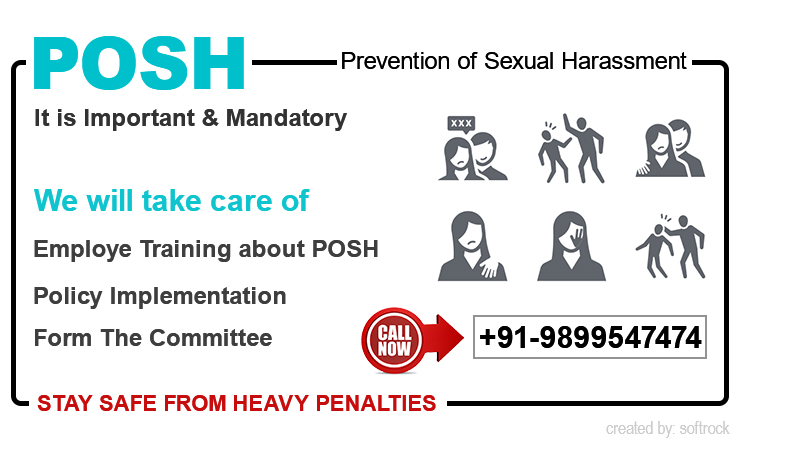Sexual Harassment of Women at Workplace (Prevention, Prohibition and Redressal) Act, enacted by the Government of India ( POSH Act 2013) makes safe workplace a woman’s legal right and all forms of sexual harassment at workplace, illegal.

Government of India (Ministry of Corporate Affairs) has made it mandatory for every organization with female employees.
What is considered sexual harassment under the Act?
(1) Physical contact and advances;
(2) A demand or request for sexual favours;
(3) Making sexually coloured remarks;
(4) Showing pornography
(5) any other unwelcome physical, verbal or non-verbal conduct of sexual nature. constitutes sexual harassment.
Section 3 of the Act widens the scope of Sexual Harassment by stating that any of the following circumstances, related to sexual harassment, may also amount to Sexual Harassment. They are:
(1) Implied or explicit promise of preferential treatment in the victim’s employment;
(2) Implied or explicit threat of detrimental treatment in the victim’s employment;
(3) Implied or explicit threat about the victim’s present or future employment status;
(4) Interferes with the victim’s work or creating an intimidating or offensive or hostile work environment for her and
(5) Humiliating treatment likely to affect the victim’s health or safety.
Who is an Employer?
Section 2 (g) of the Act defines Employer as: any person responsible for the management, supervision and control of the workplace and management includes the person or board or committee responsible for formulation and administration of polices for such organization.
What are the obligations of an employer?
As per the Sexual Harassment Act of 2013, an employer has to:
1) Provide a safe working environment at the workplace
2) Constitute a POSH Policy
3) Display at any conspicuous place in the workplace, the penal consequences of sexual harassments
4) Sensitize the Employees through awareness programs and training
5) Every employer with 10 or more employees should form an Internal Committee (IC). The committee must include:
i) Presiding Officer a lady employee appointed from Senior Management
ii) Minimum of two members representing the employees of the organization
iii) One External Member from an NGO or a lawyer
6) Provide Orientation Training and skill building programs for the Internal Committee Members
7) Declare the names and contact details of all the Members of the Internal Committee
8) Submit annual reports by the Internal Committee to the District Officer mentioning the information regarding POSH training and cases filed.
What are the consequences of non-compliance?
1) Penalty extending up to Rs. 50,000 is prescribed
2) In cases of repeat offense, the penalty will be doubled and
3) Can also lead to cancellation of business license.
Organizations must note that if a matter of sexual harassment reaches court and the court finds that ICC was not even constituted as per the Act, apart from imposing penalty as per the Act, the court has discretion to order other amount as damages from employers.
In a sexual harassment case, Madras High Court directed a company based out of Chennai to pay 1.68 Crores as damages on account of sexual harassment to an aggrieved woman.
What should you do to be compliant?
Draft a strong POSH Policy
Sensitize all employees through POSH Training
Form an Internal Committee (IC)
Train the Internal Committee members on investigation procedure, formalities, confidentiality, formatting of reports and submission
Filing of the annual report to the District Officer
Drive POSH compliance in your organization
